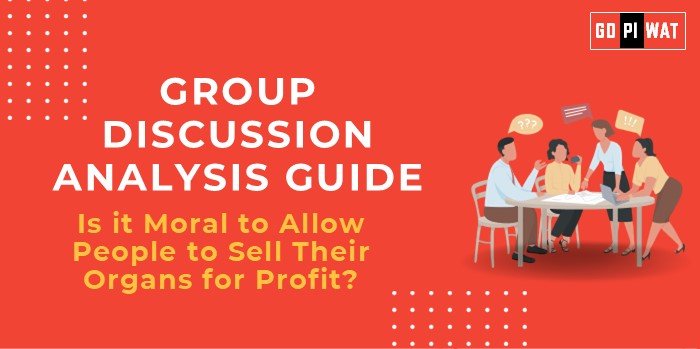📋 Group Discussion (GD) Analysis Guide: Is it Moral to Allow People to Sell Their Organs for Profit?
🌐 Introduction to the Topic
Opening Context: Organ donation and transplantation save countless lives globally, but the debate over the commercialization of organs raises ethical, social, and legal concerns.
Topic Background: The black market for organs thrives due to organ shortages, with thousands dying annually while waiting for transplants. Proponents argue that a regulated market could save lives and improve donor compensation, while critics cite exploitation risks and moral dilemmas.
📊 Quick Facts and Key Statistics
- 🌍 Global Organ Shortage: Over 150,000 patients on organ waitlists globally; 20 people die daily in the U.S. waiting for a transplant.
- 💰 Black Market Prevalence: Illegal organ trade generates $1.5 billion annually, according to WHO.
- ⚖️ Donor Compensation Models: Iran, the only country with legalized kidney sales, eliminates waitlists through strict regulation.
- 🧠 Ethical Concerns: 85% of bioethics scholars oppose organ sales citing potential exploitation (Journal of Medical Ethics, 2023).
🤝 Stakeholders and Their Roles
- 🏛️ Governments: Develop legal frameworks and regulate healthcare systems.
- 🩺 Medical Professionals: Ensure ethical adherence in transplantation processes.
- 👥 Organ Donors and Recipients: Key beneficiaries or victims in regulated/unregulated systems.
- 🌐 NGOs and Advocacy Groups: Promote organ donation awareness and monitor ethical concerns.
🏆 Achievements and Challenges
✨ Achievements
- ✅ Reduced Organ Waitlists: Iran’s regulated market has successfully eliminated kidney waitlists.
- 💰 Financial Incentives: Attract more donors in pilot studies (e.g., U.S. proposals).
- 🧍 Autonomy: Promotes individual control over bodily decisions.
⚠️ Challenges
- ⚖️ Exploitation: Vulnerable populations may face coercion or undue pressure.
- 📉 Moral Degradation: Commercializing organs commodifies human life.
- 💔 Inequity: Wealthier individuals may monopolize transplant access.
🌍 Global Comparisons
Iran: No kidney waitlist but criticized for inequality.
Spain: Non-commercial donation model leads global organ donation rates.
📄 Structured Arguments for Discussion
- ✅ Supporting Stance: “A regulated organ market can save lives and fairly compensate donors, reducing black market exploitation.”
- ❌ Opposing Stance: “Commercializing organs commodifies human life and disproportionately affects marginalized communities.”
- ⚖️ Balanced Perspective: “While organ sales can address shortages, robust safeguards are needed to prevent exploitation and inequity.”
🎯 Effective Discussion Approaches
- Opening Approaches:
- 📊 Statistical Impact: “With 20 daily deaths on organ waitlists, regulation could save lives.”
- 🤔 Ethical Question: “Does saving lives justify potential exploitation of the poor?”
- 📚 Global Case Study: “Iran’s kidney market shows mixed outcomes in ethical regulation.”
- Counter-Argument Handling:
- 🛠️ Recognize exploitation risks and propose strict safeguards.
- 📖 Highlight successful regulatory frameworks like Iran’s.
📊 Strategic Analysis of Strengths and Weaknesses
- 💪 Strengths: Reduced organ shortages, donor autonomy.
- 📉 Weaknesses: Ethical concerns, inequity.
- 🚀 Opportunities: Regulation and education to balance ethical and practical needs.
- ⚡ Threats: Black market persistence, societal resistance.
📈 Connecting with B-School Applications
- 🌐 Real-World Applications: Ethical dilemmas in healthcare economics and public policy discussions.
- 🗣️ Sample Interview Questions:
- 💬 “Should healthcare prioritize efficiency over ethical considerations?”
- ⚖️ “How can economic models ensure fair organ trade regulation?”
- 🎓 Insights for Students: Consider ethical frameworks and innovative policy solutions in business leadership.


